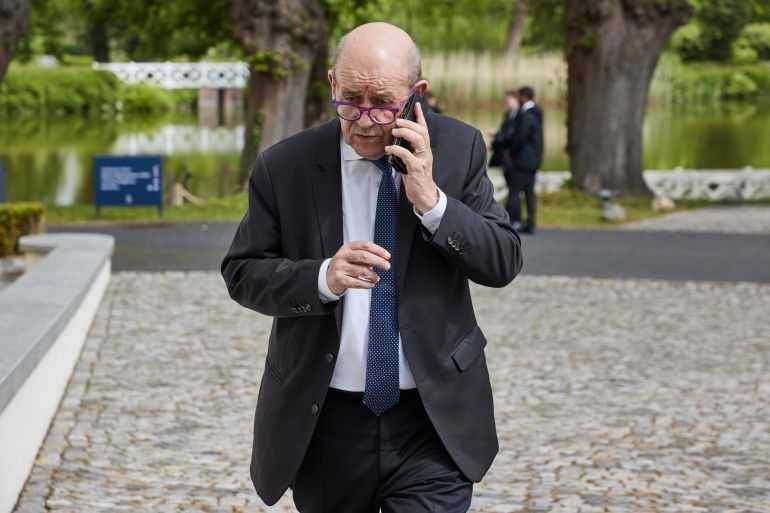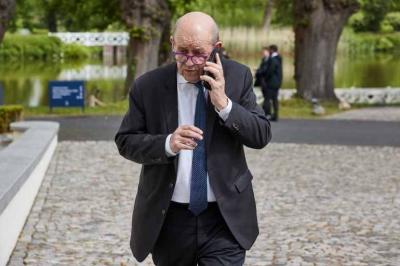Sources close to "Hezbollah" have confirmed to "Al-Joumhouria" that developments on the border front are linked to the battlefield situation in Gaza. They stated, "The Islamic Resistance has been at the heart of the battle since October 8th and will not leave the field. Its readiness is complete to follow military developments in Gaza, regardless of what these developments may be, and also to prevent any Israeli aggression against Lebanon. Therefore, the resistance will not abandon Israel, the enemy, as long as it continues its aggression against Gaza."
In this context, well-informed political sources revealed to "Al-Joumhouria" that "Western diplomatic activity continues to focus on prioritizing the avoidance of war for Lebanon, warning of its dire consequences." They noted that despite Lebanese officials affirming their reluctance for Lebanon to engage in a large war, the situation along the border remains concerning. UNIFIL commander General Arnaldo Lazaro expressed real fears that any further escalation in southern Lebanon could have devastating consequences.
The same sources pointed out that Western entities have conveyed significant concerns to Lebanese officials that military realities along southern Lebanon's border could create a new situation that surpasses the dangers of Resolution 1701, complicating the mission of UNIFIL forces in southern Lebanon and surrounding these forces with risks.
Politically, it was evident that none of the political factions in Lebanon were previously aware of French presidential envoy Jean-Yves Le Drian's visit to Beirut or what he would bring to move the presidential file forward. Besides scheduling appointments for the envoy with Presidents Berri and Mikati and several political and parliamentary figures to begin his meetings from tomorrow, various political circles have raised questions about the main motive behind this sudden visit at this specific time. Many questions are being asked about what necessitated it just a few days after the unannounced visit of Qatari envoy Sheikh Jassim bin Fahd Al Thani to Beirut last week.
Diplomatic sources in Paris informed "Al-Joumhouria" that France is in constant consultation with Lebanon's friends who share their concern about the country's situation and the need to help it overcome its crises. They pointed out that Le Drian's visit to Beirut was initially planned for a short period following his last visit, between late September and early October, but the schedule was altered due to the events of October 7 in Gaza.
The sources indicated that the essence of Le Drian's visit is an attempt to revive an opportunity that the Élysée Palace believes the Lebanese should seize in these difficult circumstances the Middle East is experiencing, and to collectively prioritize the election of a president for the republic swiftly, as time is becoming very tight, and letting it run out could lead to many difficulties and unforeseen consequences.
In response to a question about whether Le Drian is coming to Beirut armed with new ideas or proposals that impose something on the political components in Lebanon, the sources said, "Le Drian's mission is to assist the Lebanese in agreeing on the election of a president, and no one is discussing pressures or matters being imposed on them. What we see as urgent is that the Lebanese should appreciate Lebanon's interests in these conditions, beyond the political calculations that have greatly harmed the Lebanese people."
It should be noted in this context that Paris, according to reliable sources, considers that the political and partisan calculations are controlling the course of the political game in Lebanon, with direct results leading to the obstruction of the presidential election, as well as the deep disagreements regarding the leadership of the army, with a split between a group supporting the end of Army Commander General Joseph Aoun's term and calling for appointing a new commander, and another group calling for extending his term and delaying his retirement, a situation that further complicates this issue.
However, a responsible political source informed "Al-Joumhouria" that "Le Drian's visit, whether he brings new ideas or old ones, is a good and appreciated visit, indeed a necessary one, where I hope it contributes to taking the presidential file off the shelf and reactivating it towards speeding up the election of a president for the republic."
However, in response to a question about whether Le Drian's visit competes with Qatari movements regarding the presidential file, he said, "I have no information to confirm any competition or similar, let’s wait to see what he presents in terms of ideas, and based on that, actions can be taken. We heard in the media that Le Drian met with Qataris and Saudis. In addition, the Qatari envoy in his recent movements in Beirut, which lasted until Friday of last week, was operating within a Qatari initiative and ideas, and the atmosphere was acceptable.
However, sources accompanying the external movements toward Lebanon confirmed to "Al-Joumhouria" that the Qatari envoy's mission in Lebanon faced many challenges, preventing him from attracting the parties to agree on a presidential option, and the same applies to Le Drian's mission, which can be said, even before his arrival, is also very challenging.
The reason is clear, as the Lebanese interior is stuck behind a wall of obstruction, with no internal signals from any party involved in the presidential file indicating a shift in positions regarding the presidential entitlement or a retreat from conflicting terms or a willingness to sit at the table and discuss presidential options. Therefore, if Le Drian's visit is limited to repeating his previous proposals regarding inviting the Lebanese to dialogue and saying that Suleiman Frangieh and Jihad Azour did not reach the threshold for winning the presidency in the last session of the parliament, and that it would be safer to look for a third option, the answer to that is clear: he had already brought it during his last visit in September, and left Beirut empty-handed.
According to the sources, regardless of whether the visit is coordinated with the Qataris or others, what makes Le Drian's task harder at this time are two matters: the first is some political components betting that the military and battlefield developments in the region may create new balances and equations that will inevitably affect Lebanon and provide some as a motivation to invest in them and use them for political gains for their political team.
The second matter is that a portion of the Lebanese people has publicly begun to doubt the French role and does not see that France can play the role of an impartial and neutral mediator in any Lebanese entitlement, especially the presidential entitlement due to its position that aligned completely with Israel in its destructive war on the Gaza Strip.




